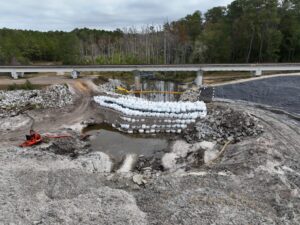
Dam Reconstruction Celebrated in the City of Boiling Spring Lakes
Restoring Boiling Spring Lakes’ Identity

Impact of Hurricane Florence
More than five years ago in 2018, Hurricane Florence stole the identity of the City of Boiling Spring Lakes. As a result of Hurricane Florence, Sanford Dam suffered catastrophic failure – due to overtopping and subsequent embankment erosion – impounding the 275-acre Boiling Spring Lake. This caused cascading failures at the North Lake Dam, Pine Lake Dam, Middle Lake Dam, and Upper Lake Dam. All these dams were earthen dams – some with gated culverts or risers – and were used to maintain water levels for aesthetics and recreational use throughout the lake system.
Assisting Boiling Spring Lakes
McGill was honored to partner with the City of Boiling Spring Lakes shortly after the storm event. Led by Vice President, Michael Hanson, McGill’s water resources team and Schnabel Engineering assisted Boiling Spring Lakes in reestablishing the impounded lakes upstream of the four City-owned dams breached by Hurricane Florence. This included development of a 25-square-mile watershed-based hydrologic and hydraulic model, dam breach analysis, spillway classification, design, permitting, grant assistance, bidding, and construction phase services for the repairs to the Sanford Dam and Upper Dam, as well as North Lake Dam and Pine Lake Dam.
Dam Reconstruction Design

Design for the Sanford Dam included increasing spillway capacity via six 7-foot by 7-foot box culverts passing under Alton Lennon Road, a major arterial road at the dam, as well as several dam foundation and stability upgrades to meet current State of North Carolina standards. Additionally, McGill obtained a variety of design and environmental-related permits for this project, including 401 / 404, State Dam Safety, Federal Emergency Management Agency (FEMA) Environmental Assessment, and FEMA Conditional Letter of Map Revision (CLOMR) / Letter of Map Revision (LOMR).
Grant Funding
A project of this caliber required multiple partners at the table to fund the $54-million reconstruction effort, including the State of North Carolina, FEMA, US Department of Defense (DOD), and Brunswick County. McGill played an integral role in assisting the City with grant compliance to secure over $17 million in FEMA disaster relief funds and has led coordination with various stakeholders to include the North Carolina Department of Transportation (NCDOT), State Historic Preservation Office (NC HPO), FEMA and Environmental and Historic Preservation (EHP), United States Army Corps of Engineers (USACE), North Carolina Department of Environmental Quality (NC DEQ), and homeowners to secure approvals and required easements.

Groundbreaking
Since the storm in 2018, Boiling Spring Lakes has been hyper-focused on bringing back its City identity and reducing the impact the storm had on its residents, local businesses, and recreational amenities. On June 17, 2023, a much-anticipated groundbreaking ceremony was held at the Sanford Dam site on Alton Lennon Road to restore the City’s lakeside view, kicking off dam reconstruction. Boiling Spring Lakes officials – along with County Commissioners, representatives from Military Ocean Terminal Sunny Point, and many others – were in attendance.
Importance of Project
Hanson detailed: “This project has required a team effort from McGill, Schnabel, City staff, citizens, the contractor, and many other stakeholders. Through determination and collaboration over the past four years, the team has designed dam and spillway improvements, secured permits and funding, and initiated the construction needed to recover the City’s beloved lakes. While the path to completion is still years away, the accomplishments to date cannot be overstated. For a community of this size to undertake a project of this magnitude is rare. The knowledge, experience, and commitment of all involved has been the cornerstone of our success and stands as an example of how McGill strives to shape communities together.”
Construction Timeline
Reconstruction efforts started in July 2023 and are expected to be complete in January 2026, bringing back the soul of Boiling Spring Lakes. To learn more about our water resources team, visit us at https://www.mcgillassociates.com/what-we-do/water-resources/. Reach out to Michael Hanson, Vice President, at 919.378.9111 to discuss your infrastructure needs.
Read More
Boiling Spring Lakes celebrates dam reconstruction groundbreaking (wect.com)
Lakes groundbreaking marks start of dam reconstruction | News | stateportpilot.com
McGill Assists the Town of Canton in Flood Recovery Due to Tropical Depression Fred


